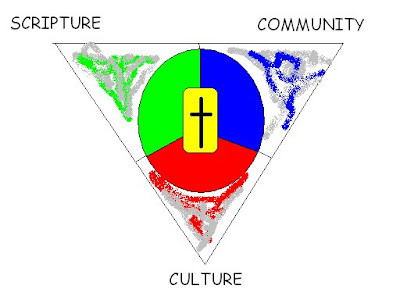A response to Tim’s lengthy comment. My responses in italics.
First, I think it’s misleading to deal with inerrancy under the heading of sola scriptura. The two beliefs do not necessarily go together.
Fair point – I’ve restored the original title.
Certainly at the time of the Reformation (which, according to your title, is what you’re dealing with – which makes it a bit confusing when you go on to tell us that you’re dealing with ‘Modern Protestantism’) belief in inerrancy was common across the doctrinal divides, and many people who believed in inerrancy did not believe in sola scriptura.
I don’t think this is true. Allert makes the point that there was no specific doctrine of Scripture until the second half of the sixteenth century. Inerrancy as a concept, especially as it functions in something like the Chicago Statement, is a distinctly post-Reformation phenomenon. It needs to be distinguished from authority in particular.
Second, and still under the heading of inerrancy, quite frankly I think you’re setting up a straw man. Many people who say they believe in inerrancy (J.I. Packer, for instance) are well aware of the discrepancies you mention , and say quite clearly that they believe in inerrancy ‘according to the standards of the time’, which do not necessarily coincide with modern scientific exactitude. I know several fundamentalists (in fact, I’ve been rather lucky with my fundamentalists – they’ve mostly been fine people), and not one of them believes that ‘either Scripture is true in every conceivable sense OR God does not exist’.
On that last dichotomy, much is in the tone! I don’t actually expect anyone to believe that – but it is the logical consequence (or, perhaps instead of ‘God does not exist’ it’s ‘I cannot be saved’). Neil has made a similar point about inerrancy, but it seems to me to avoid the substance. If inerrancy is sufficiently compromised and qualified then it ceases to be a meaningful doctrine and may as well be abandoned (three cheers) and we return to the more traditional understanding. I think we need to talk about the authority and purpose of Scripture; language of ‘errancy’ assumes the scientific standards that I think are wholly inappropriate.
Third (and still under the heading of inerrancy), as one who has spent most of his Christian life in the evangelical community, I’ve yet to meet an example of what you call ‘Protestant neurosis’ – ‘individual interpretation, means all the weight on the individual – what if I get it wrong?! Oh doom!’ On the contrary, most of those who believe in the right of private interpretation are quite convinced that it’s their neighbours who are getting it wrong…!
All I can say is that I’ve dealt with different people! Perhaps it’s something about being a non-evangelical, that people who are wanting to come out of a culture are likely to say different things to someone outside of that culture. The same would apply in reverse of course.
(And by the way, the catholic position holds to private interpretation just as strongly – the pope’s private interpretation! Very few people who say that the church is the authoritative interpreter of scripture really mean what Paul means by ‘the Church’ – they mean ‘the hierarchy of the church’).
I think that’s a caricature of the RC position; my view is moving closer to the Pauline with time (partly because I’ve been surprised by how much I disagree with the catholic logic of RW’s letter to the Central Floridians)
‘Church experienced most important and formative growth WITHOUT the “Bible”’ – this is hugely misleading. You give the impression that there was wide disagreement about the NT canon until the 4th century, when in fact as you know there was in fact substantial agreement early on.
That’s why “Bible” is in scare-quotes – I’m trying to distinguish between ‘Scripture’ and ‘The Bible’.
Furthermore, the early church considered the OT (as reinterpreted by Jesus and the apostles) to be authoritative, and also considered itself to be under the authority of the apostolic witness.
The early church had a different OT to the one we now have; and ‘the apostolic witness’ was bound up as much with the community, worship and rule of life as it was with Scripture.
I’d be very interested to see an instance from the first 5 centuries, even before the finalisation of the canon in the 4th century, of a bishop or council considering himself or itself as having the authority to set aside a clear teaching from the documents of what we now call the NT.
Not sure what such an example might be – you seem to be asking for an example of the church doing something that the church didn’t agree with, as it is the rule of orthodoxy which determined the selection of texts (I don’t know if there is one or not) – but Allert discusses a Bishop allowing a church to study the Gospel of Peter, and use it in worship, and only intervened when it became clear that the teaching from it was heretical (docetic). 3rd Century I think.
Similarly, your list of the things that the Bible ‘significantly post-dates’ is true only if you restrict the word ‘Bible’ to mean ‘the final agreement on the canon in the 4th century’. But in fact, as you know, the church submitted to the authority of the vast majority of those writings long before the 4th century. In fact, I would contend that all of the biblical documents were written, and accepted as authoritative by at least a portion of the early church, long before the universal acceptance of any of the things you mention here (with the possible exception of weekly communion).
Well, that would be an interesting discussion to have. Gospel of John, for example, is generally considered an end-of-century text, and you certainly had Bishops by then (whether they were Bishops as we understand them is also an interesting question…) My point is as much about whether it makes sense that a community should uphold as sacred a text which – in certain views – outlaws the embedded practices of that community.
I am of course in complete agreement with your statement that Jesus is the Word of God in the truest sense, and that his authority is paramount over all other claimants (including scripture). But I note that in your own beliefs, when it comes to a specific example of the teaching of Jesus – nonviolence and love for enemies – you are not prepared to give him that authority – you prefer the OT and classical reason!
Well that’s a whole different issue, but at the heart of my perspective is an acceptance that I’m mired in sin, and that sometimes it is more sinful to try and be sinless. It’s a paradox but I don’t see any way out of it as yet.
Finally, I’d be interested to know where you locate classical Anglicanism on this spectrum. Would you not agree that ‘sola scriptura was held by all the Anglican reformers and is the position assumed by the 39 Articles and the Book of Common Prayer, while the view that you are advancing was precisely the view that the Anglican reformers were objecting to in Roman Catholicism?
Er… short answer to the latter question is no. Doug Chaplin has been doing some excellent writing on this recently – I’d particularly refer you to this post. I think Anglicanism is the whole spectrum, at least ideally, and that’s certainly what I’d argue for.




 the doctrine of penal substitution. As I understand it he wouldn’t describe himself as a theologian, nor would he say he was preaching the whole message of the gospel in this sort of book – it’s just that this is the message he has been given to share. Fair enough.
the doctrine of penal substitution. As I understand it he wouldn’t describe himself as a theologian, nor would he say he was preaching the whole message of the gospel in this sort of book – it’s just that this is the message he has been given to share. Fair enough.